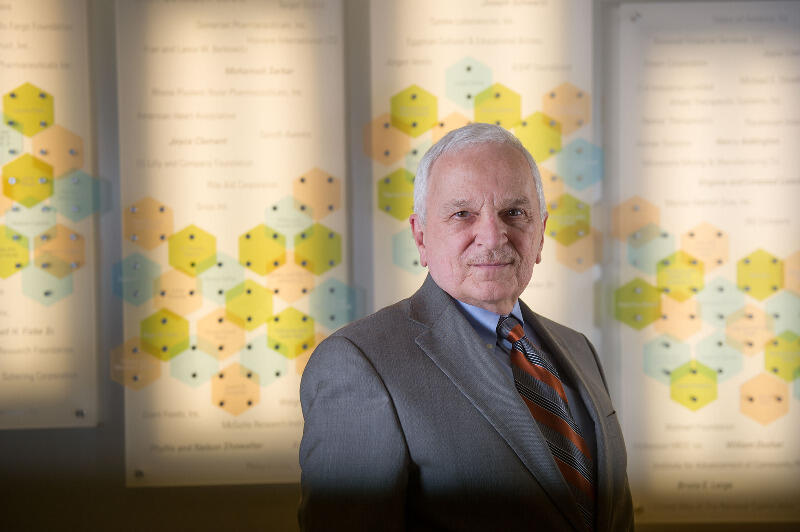
May 29, 2014
A dean’s fond farewell: ‘I’ve been so fortunate’
Share this story
Today Virginia Commonwealth University will honor Victor Yanchick, Ph.D., for his 18 years of leadership as professor, dean and Archie O. McCalley Chair of the VCU School of Pharmacy.
Like anyone nearing a new phase in life, Yanchick has found that looking forward gives him pause, causing him to reflect on his career thus far.
His 18 years as dean of the VCU School of Pharmacy have sped by … but then again, so did his previous tenures at University of Texas at Austin and University of Oklahoma.
“I’ve been so fortunate,” he says. “It’s been amazing to me that I’ve been able to experience what I’ve experienced and had an opportunity to lead two schools and to be a major player in a third, to be in pharmacy education over the last 46 years while it’s been totally transformed — not only education but practice.
“To have been partly responsible for that transformation is amazing. I feel I have been one of the agents of change and am very proud of that legacy.”
In the beginning
Although he worked as a hospital pharmacy technician in high school in Joliet, Ill., young Vic Yanchick’s original plan was to be a pediatrician. A co-worker’s suggestion that he obtain a bachelor’s degree in pharmacy made sense; he needed a four-year degree before medical school.
The idea was to earn a pharmacy degree — which Yanchick did, at University of Iowa — then work for two years while saving enough to pursue an M.D. He had been accepted by the medical school at University of Illinois in Chicago when, as often is the case, love intervened. In May 1963, just a year after finishing pharmacy school, he and Mary Jo Kietzman, a nurse, were married.
Marriage – and wanting to start a family – changed Yanchick’s mind about med school. He set his sights on a career as hospital pharmacy director and returned to Iowa for an M.S. and residency. “The Iowa residency program was really a forerunner,” he says. “One of the first clinical pharmacy programs in the country, one of the first places pharmacists were permitted on the floor to look at patient records.”
The conversation about clinical pharmacy was just beginning and, as it happens, Yanchick ended up teaching the first clinical pharmacy course offered at Purdue University. Serving as an instructor and pharmacy director while working on his Ph.D. and doing research in drug plastics, his new goal was to be a scientist at Abbott Laboratories.
In an unexpected twist, Purdue Dean Varro Tyler, Ph.D., took Yanchick under his wing. Yanchick still remembers Tyler’s life-changing advice: “He said, ‘The students like you. You need to be in an academic environment. Before you sign with Abbott, would you interview at some schools to see what it’s all about?’ … He said he could see me as a dean one day!”
Fast track into academe
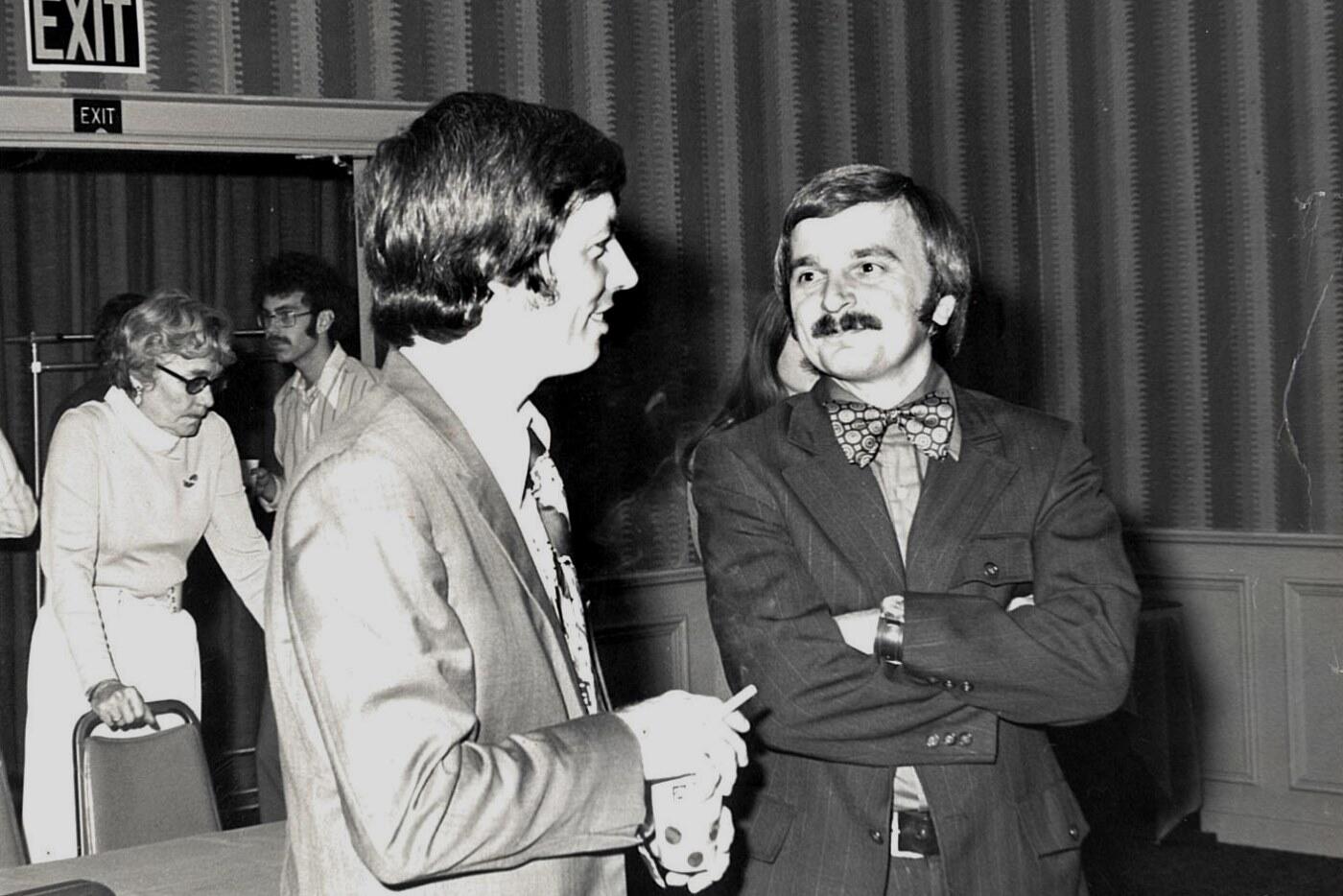
Yanchick took Tyler’s advice. First stop: University of Texas at Austin College of Pharmacy, in part because the university had a drug plastics research lab. Within a couple of years of joining the faculty, he was named assistant dean and progressed to associate dean.
“I was a great dean when Vic ran the school!” says UT College of Pharmacy Dean Emeritus James Doluisio, Ph.D. “He was called the ‘student dean.’ You can’t imagine how important he was to our program.”
Yanchick recalls his years at Texas as some of the best times of his life. But when his first Ph.D. student, Loyd Allen, Ph.D., headed the dean search team for the University of Oklahoma, Yanchick was persuaded to apply. (Allen, now professor emeritus of Oklahoma, went on to found the International Journal of Pharmaceutical Compounding.)
“I said no. Loyd said, ‘Are you sure? At least come and give us some advice.’” Thus began the talks that would lead Yanchick to the position of dean at University of Oklahoma College of Pharmacy.
“I loved it,” he says. “It was a great experience.”
Eleven years later came the call from VCU, where Dean John Ruggiero, Ph.D., was retiring. Would Yanchick be interested in moving east? He would; VCU School of Pharmacy had a great reputation, and he liked Virginia.
Yanchick’s wife had been ill with non-Hodgkin lymphoma but was in remission and had returned to work. “We thought we got it,” he says. “We said, there’s one more move in us.” Their three children, Jeff, David and Jill, were adults by that time.
Sadly, Mary Jo Yanchick died a year after the move.
Early years at VCU
|
Victor A. Yanchick: in brief 1962 — B.S. pharmacy, University of Iowa |
Despite personal tragedy, Yanchick dove into his deanship. “We had a talented, diverse group of faculty, a high level of quality, but they weren’t pulled together.” He was concerned about departmental structure and the need to ramp up clinical pharmacy.
A 1997 faculty retreat resulted in the restructuring of departments: The Department of Medicinal Chemistry and the Department of Pharmaceutics and Pharmacy reorganized to become the Department of Medicinal Chemistry, the Department of Pharmaceutics and the Department of Pharmacy (the latter is now known as the Department of Pharmacotherapy and Outcomes Science). A wish list was formed: more focus on geriatrics, ambulatory care and community practice; residency fellowships; interdisciplinary programs in research and practice; faculty mentoring and development; off-campus programs and development; and integrating technology into the classroom.
“Soon after I arrived,” Yanchick says, “I put time and effort into seeing how we could catch up in technology as well as how to offer more modern delivery of classroom teaching.” He smiles, remembering that it took three or four years to talk the university into combining two smaller classrooms into what is now the Smith Building’s largest, the only one that can accommodate a full first-year class of Pharm.D. students.
Another goal was to expand the school, space-wise – both the faculty and student body were growing – and several years later, the Business Office, Office of Experiential Education, Division of Pharmacy Administration and a few conference rooms and labs made their way across the street to McGuire Hall (the building where most pre-1985 alumni spent the bulk of their student years). In 2008, the Department of Medicinal Chemistry moved from Smith to Biotech One, part of the Virginia Biotechnology Research Park.
At the same time, Smith was being refurbished and technology was being upgraded – an office here, a lab there – until 2009-10, when a $5 million allotment from the Virginia legislature allowed major reconstruction on the building’s first, second and fifth floors, resulting in state-of-the-science classrooms and a more student-friendly “commons” area.
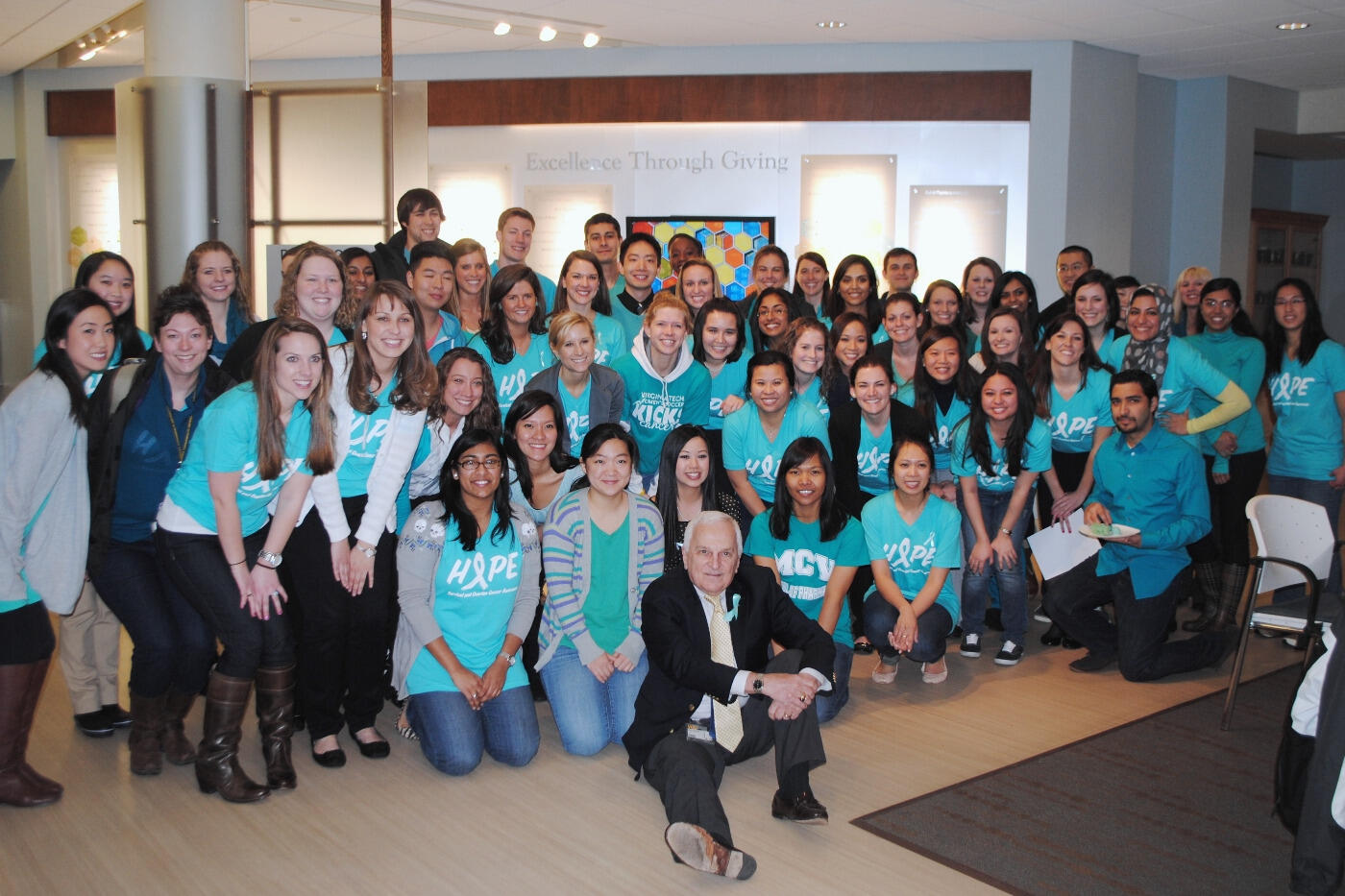
Academic expansion
When Yanchick arrived, VCU School of Pharmacy, like many nationwide, had begun the curricular transition from a B.S. to Pharm.D. degree program. “When I got here,” he says, “it was part B.S., part postbaccalaureate Pharm.D. … and there was also a nontraditional program for B.S. students who wanted to earn a Pharm.D. degree.”
The first all-Pharm.D. class graduated in 1999. The next major curricular change – in response to new Association for Clinical Pastoral Education standards – took place in 2008. Also, says Yanchick, “It was time for an overhaul, and we wanted to go much more team-based.”
The Office of Experiental Education also grew as a result of the new curriculum and accreditation requirements. More interprofessional rotations were developed for fourth-year Pharm.D. students participating in Advanced Pharmacy Practice Experiences, and the new Introductory Pharmacy Practice Experiences exposed first- through third-year students to more real-life pharmacy settings.
The increase in community service and community engagement has been one of the biggest changes for students, says Yanchick. “The School of Pharmacy has a strong commitment to community engagement, to serve populations that need help and to conduct research on how to improve wellness in the community.”
The graduate program – offering master’s and doctoral degrees – had been in place since the late 1950s, but the number of graduates had declined to the point of endangering the program. A new office, Pharmaceutical Sciences Graduate Programs, was created in 2004 to address the need; since then, the number of graduate students has tripled.
In tandem with the graduate program’s growth, the school’s research enterprise quadrupled, from about $2 million in 1996 to more than $8 million in 2012-13. That, Yanchick points out, was despite the fact that the school had to cut budgets for many years due to the economic downturn.
“We could have had a mass exodus,” Yanchick says. “But we not only weathered the storm, we grew. We’ve been able to create an environment for learning, research and collaboration, and that’s hard to achieve.”
That environment continued to expand in 2007 and 2012, respectively, when satellite campuses opened in Fairfax and Charlottesville to allow third- and fourth-year students new opportunities.
“I’m very proud to have helped bring together a highly talented faculty, staff and student body who work together and respect each other,” Yanchick says.”It’s through them that we have seen all the successes.”
Taking it to the world
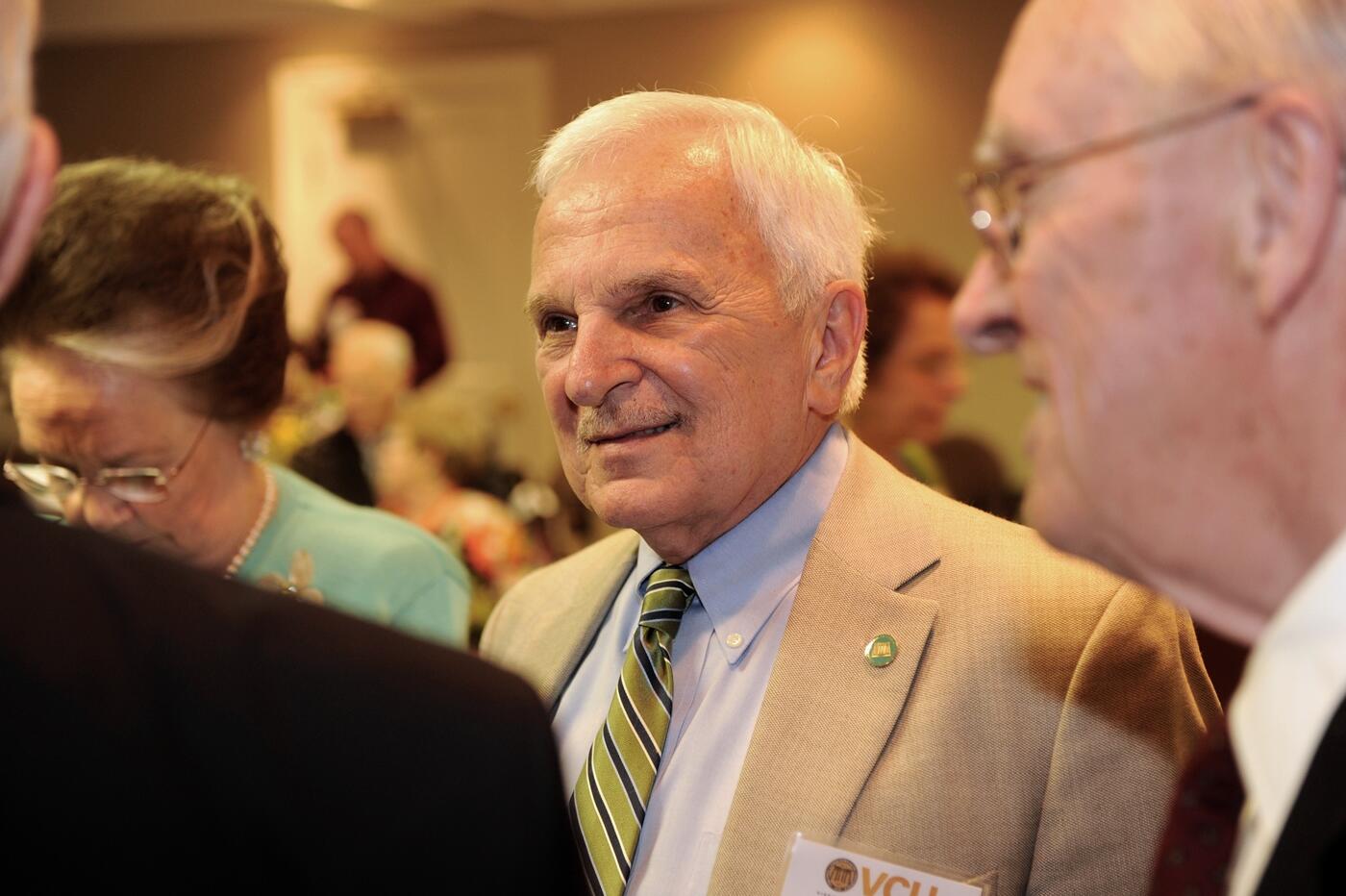
In recent years, Yanchick notes, School of Pharmacy faculty have served as elected officials in a number of national pharmacy organizations. For example, Jeffrey Delafuente, associate dean for academic affairs, is 2013-14 president of the American Society of Consultant Pharmacists. Gary Matzke, Pharm.D., director of pharmacy practice transformation initiatives, was 2007-08 president of the American College of Clinical Pharmacy. Professor and alumna Jean-Venable “Kelly” Goode, Pharm.D., has served for several years as an American Pharmacists Association trustee.
Yanchick himself served as president of the American Association of Colleges of Pharmacy in 2008-09, traveling the world to help promote pharmacy education. “A benefit of serving as AACO CEO is the close working relationship I have with our presidents,” says Lucinda Maine, Ph.D., executive vice president and CEO of the association. “Vic was my ‘lucky No. 7’! He challenged us all to think off the map and stimulated AACP’s work in global pharmacy education. It represents his enthusiasm for thinking globally while acting locally to improve pharmacy education and health care.”
AACP is where Yanchick got to know Joseph DiPiro, Pharm.D., the man who eventually would be his successor. “I have found him to be extremely competent,” Yanchick says. “I have always been very impressed with his leadership style and commitment to pharmacy.”
In a case of “small world,” it was Yanchick’s University of Texas dean, James Doluisio, Ph.D., who later would write a letter to DiPiro recommending Yanchick for AACP.
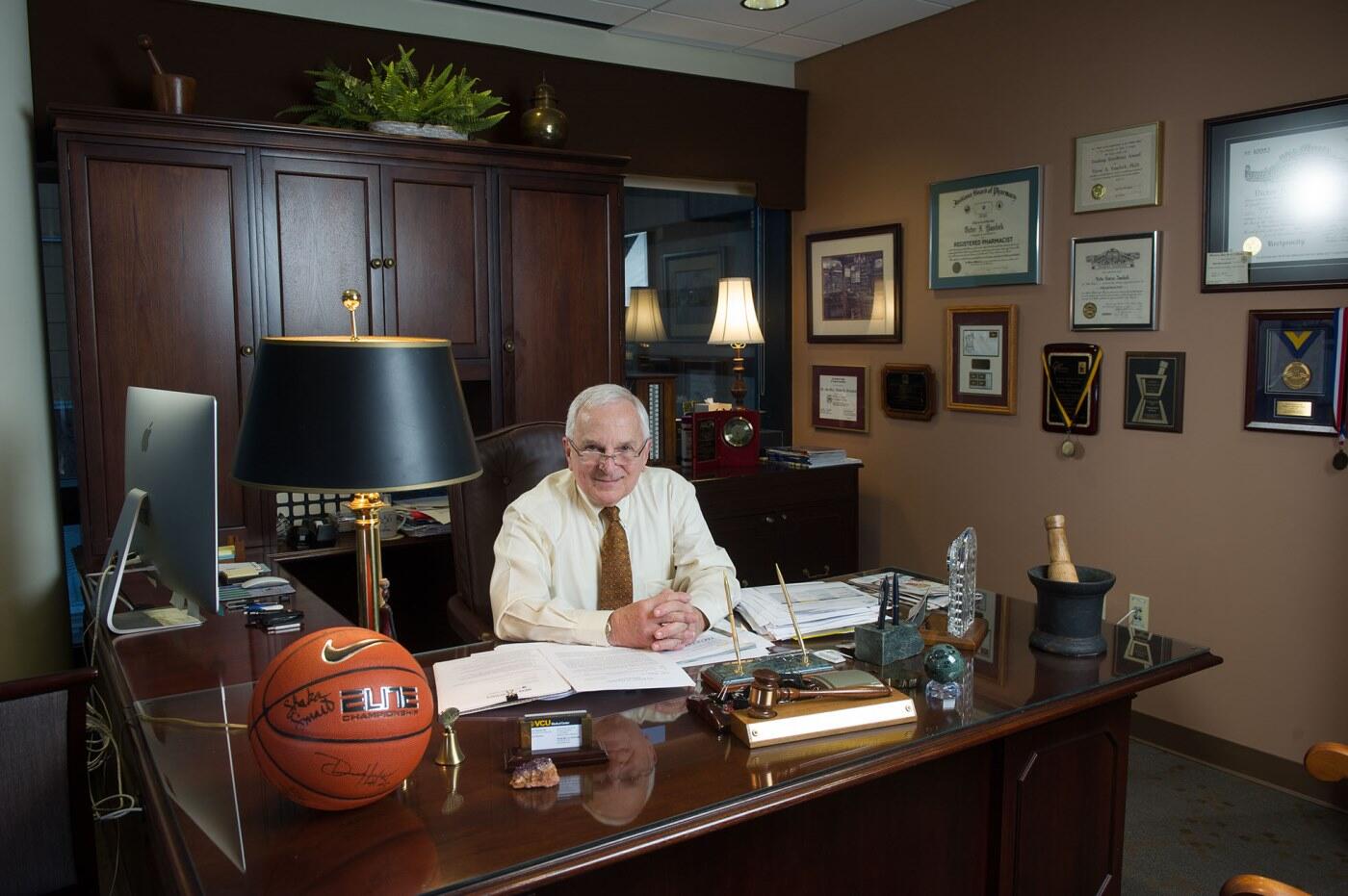
Back to the future
During his 46-year career – and particularly during the past 18 years – Yanchick has seen phenomenal change in pharmacy practice and education. “When I went to pharmacy school, we were taught basically to be chemists and dispensers of drugs. We didn’t have one day of patient care or pharmacotherapy.
“We were told to stay in our place, don’t talk to patients. If they had questions, we were to refer them to our physicians.”
This struck Yanchick, from the beginning, as wrong. He was pleased, in the 1970s, when the “huge debate” began. “We thought this was something pharmacists should be able to do.”
Now, he says, “Pharm.D.’s are the drug experts. They have the depth and scope; they’re the only health professionals educated in pharmacokinetics and pharmacodynamics.
“I think we’re reaching the tipping point now. In many environments, pharmacists are full-fledged members of health care teams. It’s already happening in hospitals; the last frontier is to bring community pharmacists into the team.”
With the issues involved in providing health care to all, he says, there is a need for more professionals directly involved in patient care and patient outcomes: pharmacists, nurse practitioners, physicians’ aides and the like. That can also have a direct effect on wellness and prevention, he adds. “Less is more. We need to get people on the least amount of drugs possible.”
The other big change agent, as Yanchick sees it, is technology. “It will be the biggest factor that will change the way health care is delivered. I can already electronically access my own records, contact the doctor and ask a question, order refills.”
Next up
As pharmacy continues to evolve, so does the dean’s future. He and his wife Donna – a high school classmate with whom he reconnected at their 40th reunion in 1998 – plan to do some traveling. “We’d like to see our kids [and grandchildren] more than a couple of days at a time,” he says. He is pleased to note that his sons, both pharmacists, followed in his footsteps and that his daughter – not as big a fan of the sciences – majored in interior design.
In retirement, Yanchick will continue to paint, an avocation he picked up about a dozen years ago that has provided satisfaction and relaxation … not to mention thousands of dollars in pharmacy student scholarships via watercolor auctions.
“I want to learn new things. Maybe teach myself Italian. Take painting lessons in a different medium. … I was taught by my parents that you can do whatever you want to do.”
VCU School of Pharmacy Dean-to-be DiPiro says, “I well know how much [Dean Yanchick] has accomplished in our profession. The faculty, staff, students and alumni of the School of Pharmacy have a lot to be proud of and are in a good position to lead the profession in the years ahead.”
“Vic has provided visionary leadership throughout his tenure at VCU,” Delafuente says. “He can proudly retire knowing that he is leaving the school at its apex.”
Subscribe for free to the weekly VCU News email newsletter at http://newsletter.news.vcu.
Subscribe to VCU News
Subscribe to VCU News at newsletter.vcu.edu and receive a selection of stories, videos, photos, news clips and event listings in your inbox.









